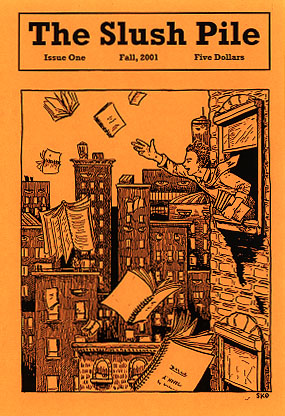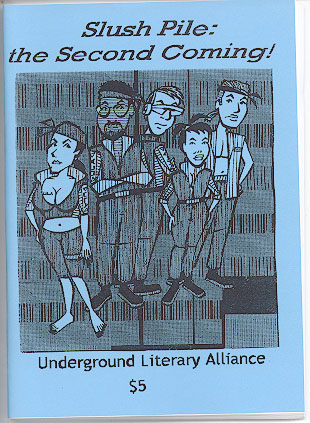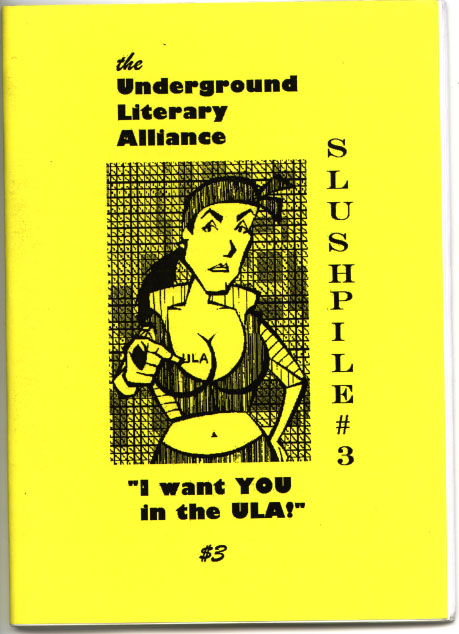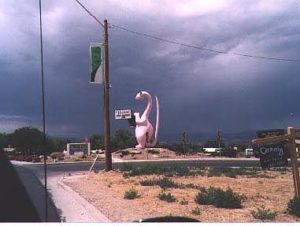The Glory Days of Independent Publishing
The Inner Swine wrote:
[ ]
> My impression has always been that people tend to glorify the past (even
> eras they have no direct experience with) as a paradise of morality,
> intelligence, and basic virtues while the modern age is viewed as
> corrupted, in decline, and ignorant, and that they do this mistakenly.
You’re right, we can’t get carried away. We have to get out
of flip-flop mode entirely, no matter what the take, and instead be
discerning. It’s good that old Jim Crow laws are gone, but there are
new Crow Jim laws that bring their own bad influence. It’s nice that
we have better cures for cancer, but we also have more new cancer causing
agents. Old coal is deadly in many ways as fuel, but new nuclear has its
own risks. It’s nice that McDonald’s offers a salad. Each aspect as to be
measured. New principles come into play as old depart.
No primary culture causes the core to rot but frees up
chances for other cultures. No primary religion results in mass social
collapse but frees up tiny pockets of people to do their own exploring.
Their work might result in the discovery of what’s needed to pull the
masses back together again. It’s all a gamble. Certain periods are
known to be more of the ‘skin of our teeth’ type, where culture/integrity
shrinks to a tiny vestige which might be entirely lost, or not…tense
times abound in history. It’s action-packed. We need to study old and new
to see if we find value, if we do, use it.
[ ]
> political leanings back in the 50’s or 60’s or 70’s or 80’s? Did
> publishing houses really follow an independent and adventurous path back
> in the day, or were they the same sort of shallow profit mongers they
> are today?
Publishing had what is called a ‘culture’ at one time. Today
it’s a ‘business.’ Publishers really did handle Bibles and Dictionaries
in order to fund innovative and progressive art. Publishers really did
foot the bill to give people they personally admired a chance. You might
say they had the margins to do that back then, but obviously they
could’ve had MORE money if they didn’t. So what was life about back
then? Something other than money? Unimaginable. Today IS different.
Across the board in publishing it’s about squeezing every penny. It didn’t
used to be. There were Golden Ages. Often tied to individuals. Who
inspired others and set a temporary tone to the trade. People with
character instead of Tony Roberts. You takes your picks….
Publishers boosted writers who they wanted to simply
hang out with (in the case of Hemingway). There were dry spells
and fertile spells in American literature. The 50’s were a RICH time
in US lit. The likes of which haven’t been seen since. Since Hollywood
clinched its position on top of both NewYork and academia. The good
leads have been allowed to trickle out. Wylie’s ‘Generation of Vipers’
went to Thompson’s ‘Generation of Swine’ and WAS STOPPED. The last trickle.
Legal and marketing really DIDN’T have as much of a say back then. Heck, people
risked jail with what they published (because of its perceived greatness to them,
not just to protect the rights of scum—Ulysses and Miller are DIFFERENT and
BETTER than Diana and Goad). Now they just reissue those same old banned books
and pat themselves on the back instead of continuing to press the point.
Banned books is HISTORY. Is the exploration of presently suppressed writing
a big topic in the US media and academy today? How does the new banning
work? Would they have a Keroauc on TV anymore?
Back then on TV there were more and LONGER interviews with real writers.
There were more real writers. Our niche tokenist scene today is particularly arid.
Obviously it wasn’t cool across the board. In the end, the fact that advertisers
had more say over literature than Hemingway contributed to his
breakdowns (same with Ezra Pound). Writers were allowed in for awhile,
which made them think they won the war. They hadn’t. The soap-makers
were still on top of culture. But at least they were in the light for awhile.
Radical tracts were read by social classes across the board. They were
available in drugstores for a dime. That was a good time and gave the
culture a nudge upwards. What the people did with it was their own business.
Turned freedom into amusement and now they get what they deserve.
But there was an opening, as opposed to now. I mean, committees?
TQM? Niche marketing? Something good stands a chance?
It’s a constant fight. Some (smart) oldtimer said an age is always
looking for its poet. It’s so arid now, the tension so great, that perhaps
a new star will spring forward and start it all over again soon. Or maybe
it’ll stay as a low rumbling, like the poor Soviets endured. Or maybe
THEY’ve won. That’s the drama of it. It’s playing for keeps, live ammo.
Culture can always lose. Orwell said the future is work and television.
The Soviets did a good job at quashing culture, but the guys who BEAT
them are in the saddle now.
Eisenhower warned against the Military-Industrial Complex, but he
added that even more dangerous was the Corpo-Govt-Academic Complex.
A whole generation jumped on the first warning and tried to defend us
against it. Has anyone made much noise about the second?
Has it gotten anywhere? Is culture being left for the pickings?
Whew…but one last thing. In the 60’s there really was a push to
get the whole country optimized as far as higher education went.
People were ENCOURAGED to go to grad school. Not just for Voc Tech.
We wanted to boom out our elites. Expand our ‘best and brightest.’
SEARCH for them, give everyone a swing. History and Philosophy
were FINE fields to work in. And it was paying off; it was
a fertile time. But it cost $ and it inspired some dangerous ideas.
(Did we want our infrastructure strengthened so much? LIKE THAT?
Too much knowledge is a dangerous thing…to the status quo.)
Then Nixon was elected to put the damper on that. The Grey Flannel
bit back with a vengeance and academia turned hard into a place for
toadying careerists and brown-nosers just like the Foreign Service or State
Department. A place to hide. How many use tenure as a bully pulpit
anymore? (Except as a way to preach to their converted and mouthpiece
for them.) Jack Saunders says he and his pals were caught in the
middle of the pipeline when it was turned off and got a special view
of the starkness of the change. Overnight locks were changed and
smug grins came out. Hunter Thompson also wrote about his
view of when the wave crested.
*****
Are there really so many books?
The marketeers talk about x-many jillion books released each year.
Booksellers feel overwhelmed.
But are there really all that many?
You could start by testing what’s out there by any ‘good book’
standards you like. How many does that leave?
Why not eliminate redundancy? —So many big publishers just
want to get their finger in the game of their rival, usually creating
worthless copycats. Do we really need to consider them?
I know what Voc-Tech is as compared to Education: it’s something
different—it’s task-training—and does not replace Education. Thus
are all the Shop Manuals out there rightly called books? They used to
stay in their closed-circle markets (bookstores still don’t try to carry
parts-lists for auto-supply stores). Perhaps the How-To shouldn’t
even be given an ISBN? (Ouch!) Call it something else. IS’Manual’Number.
Are knockoffs, tie-ins, copycats…books? Give them different numbers, too.
Make movie theatres be the only place to buy books by or about celebrities.
I know that bookstores are broadening what they carry out of desperation.
But greeting cards, calendars, mousepads and popourri aren’t books either.
Whenever you change out of desperation, you’re not less in trouble!
You’re being led down a path. The new format of bookstore is likely
selling and preparing the masses for the new format of TV as much as
anything else.
Orwell said the future holds only two things: work and TV.
Only a REAL bookstore could do anything to stop that.
If bookstores, or anyone, started toeing the line, saying that
trash stops here, the real idea of book could be regained.
Literature happens when writing comes up against the legal
establishment, said Nelson Algren. Literature is the only way
a culture can know itself and know what its options are, said
some other great writer. These guys weren’t blowing smoke.
The canon isn’t dead either. It welcomes any that meet its standards
of a real book.
*****
Trouble with the Small Press
Trouble with the Small Press?
by Jeff Potter
I’m stalled out on a bunch of big questions about the small press scene that I haven’t been able to find any good info about. When I post about it on the internet people usually just yell at me. Their heat alone seems indicative that something is going on out there. Well, I know you all can do better! Here goes…
*DO BOOKSTORES HELP THE SMALL PRESS?* It’s painful to read that small press gurus such as Poynter, Jenkins and Co. say that bookstores are a bad place to sell small press books. Sad. I really want to insist on my small press titles being shown in public alongside the mainstream books so that my superior quality can be better appreciated. Websites are nice, but a bit too quiet. Anyway, how does the book trade respond to this rep they’re getting? It would be humiliating, I should think. It seems to indicate that bookstores simply are simply refusing to rise to the challenge of knowing their stock and what’s available. Yet they’re suffering, too. I would think the key to their success would be in showing more leadership. Refuse to stock a bunch of copycat titles. Pick and choose and know why. Stick to your roots. This retreating approach they seem to be using with selling gifts and coffee doesn’t seem smart.
*JUST IN TIME PRINTING?* Any news on the frontiers of ultra short run printing? It’s amazing how pricey even the shortest ‘short run’ printers are. It doesn’t look like ‘Just In Time’ has really made it to printing yet. I’ve been working with a local DocuTech/perfect-binder who can get me runs of 10 for $4 apiece with bookstore-worthy glossy thick perfect bind covers. This seems to be a great new direction for opening up publishing. But I seem to be the only one doing it. I’m getting some bookstores to stock these items, too. It’s early, though. They’re great for Net sales, of course.
To keep all of my 20 OYB titles in stock the normal short run way that I’d need to invest about $50K! That’s just not realistic. I really think that such pressures change the kinds of books that the small press can put out. Basically, they all have to be surefire. The need for ‘no risk’ in publishing results in what we see in the total domination of the small press by how-to’s, guides, directories, series, knockoffs, spinoffs and funded titles with captive audiences.
By using DocuTech and a perfectbinder, I can keep 20 titles in stock for $1000. I get reprint turnaround in 2 weeks. That’s more like it!
*BACK TO THE FUTURE?* I suspect that in the end I’m going to have to get my own press and printing equipment. Isn’t that how it used to work? How many still do it this way? Maybe it’s just not reasonable to expect to pay anyone to make small press books for me. Plus, I could ensure top quality. I could make art editions. Cool! (Do you know of anyone who has a little press and other setups for sale cheap?)
*BIG “INDY” BOOKSTORES ON THE SKIDS?* It’s amazing how Borders is taking over the stocking control for bookstores that it wholesales to. So that ‘indy’ bookstores who work with them can’t make even one decision about the books they stock!!! They can only special order.) Otherwise, they have to stock what they get and seem to be clearly warned to not bother the buyer. What’s even weirder is that the caring, concerned book professionals at our local indy store tell me about this like it’s a fine new thing. Even the manager doesn’t seem to mind that she can’t stock titles as she pleases. It’s enough to make one start to run around yelling sometimes.
*THE TROUBLE WITH DISTROS* When I try to sell even to little, literary indy shops today they act all happy for my books and say they’ll carry em, then they say “So who’s your distributor? If they’re distro’ed, I’ll order em!” (smile). –Friggin Cheshire cat grin. What are they, idiots? How many REAL small presses can afford the 55-65% take that a distro grabs? Like, ZERO! They act all miffed, like I’m being stubborn. Why won’t they admit that the biz of small press today is 95% driven by either financed academic presses and money-oriented outfits. And that the real small press is for all intents banned from bookstores. I need all the margin I can get or the kind of books I do can’t be done.
Have you seen a traditional owner-operated small press title, printed in a garage, placed in a nice new bookstore lately?
Can a real small press survive the 55-65% distro bite? Maybe I’m off. But maybe it would really help if, say, a real small press could get a special ‘tiny guy’ account set at, say, *40%*? (Then the bookstore gets only 30%.) —Give the little guy a break to help the cause. Don’t they want to support the grassroots where the culture really comes from? A little Affirmative Action? Would the diff b/w 40% and 60% be real help or support? I have a feeling that it would change the face of what is being published. It would open it up and be a real shot in the arm to reading and to what is available. This would then have a trickle-up affect of reviving the biggies, too. Remember, right now isn’t reading moribund?
I would think that a movement to get bookstores to deal direct with small presses and to offer a 30% discount and 30-day terms would do a LOT to pump some life into this scene which seems about taken over by the 60% 120-day distro.
*NEW FACE OF THE ‘BIG’ SMALL PRESS?* I checked out the Top 25 “Small Press” bestsellers at Amazon.com the other day. Humorous! Not a one that anyone would really call ‘small press.’ And not a one that would’ve even been called a ‘book’ 30 years ago! There was a baby-naming kit, a DIY divorce kit and management guides and stock option helpbooks. Lord help us! They call them ‘Book Shaped Objects.’
*****
What is the Small Press?
It seems like there’s usually a couple mags devoted to
small press action. One avail by mail. Another at newstands.
And they both are usually painfully bad. They seem to change
hands every few years. And they seem to be aimed strictly
at the money side of things. How to milk this scene? they ask.
How to get grants and how sell movie rights. How to create
a kids book series. Success stories. It seems like they’re
usually just straining to be like the big publishers, to be
farm leagues and talent scouts for the big guys who they
kiss up to. So basically that they’re no better than the
big megacorps.
I recall a few years back that Permafrost zinester Karl Myers
wrote reviews for one of them. That was a time when they
were good. Maybe the trade mag is good again.
It seems like there’s at least several scenes all going on here.
And do any of them relate to each other? Seems like they
should all keep in touch, if only to hassle and jab.
OK, we have:
*zining
*literary mags
*mail art
*entrepreneurial
*vanity
*selfpublishing
*trade resources
*consultants
Vanity—I think that Vanity presses are somewhat off the bottom of the chart.
This is publishing other people’s stuff for pay.
Selfpub—This is the area of church and club publishing. Sales not impt.
DTP has helped raise the quality level here sometimes. Some of my
favorite recent books come from this area (a wild art book put out
by some fishing lure collectors, and a history of a big old local canoe
race full of gorgeous photos and rugged unpublicized canoeing heroes
of past 50 years)
Entrep—There’s the movement to make money with small presses, trying to
figure out the easiest ways to make spin-offs, sell rights, and track
everything on computer.
Mail Art—Seems like mainly older people from pre-computer, who’ve been
fighting the wars with the publishers for decades now, got nowhere, and who
now only deal direct, maybe by way of class ads and mailers, but who mainly
rely on word of mouth, personal chains of friends. Mostly not zines. All other
art.
Literary mags—nearly all academic and/or grants based. They support, advise
and encourage each other. No one reads or buys the results.
Zining—kids, pop culture, networked by way of parties and review zines.
Resources—A bunch of sometimes wildly pricey ($300 LMP), sometimes
cheap, directories, newsletters and CONFERENCES aimed at small presses.
Consultants—‘Small press stars’ who write how-to books on Guerilla Marketing,
publishing and such, and who run the trade mags and conferences and clubs.
******
I recall a good story from Jack about him going to a small press seminar,
and how an entrep publisher showed up there and looked around him like
he was surrounded by weirdoes. I think he even said that he didn’t fit;
that they were amateurs (said with a sneer) and that he was trying to
make a real living. He was likely making tourism guidebooks and they
were scrabbling to make poetry rags (not sure that the academics were
there, so maybe this was a seminar of the Mail Art Crowd). The two
worlds did not meet.
******
Rare In-Print Books Booth
Hi Jack….
I’ve been having good luck lately in public affairs. The local boat show people ask me to put up a booth every year. I bet not half of what I display has anything to do with boats, but they say I have the funnest booth. Then I have the Alternative Outdoor Library all set up for browsing, with my zines and rare independent books. People seem to like it.
I’ve also been going to the huge local Antiquarian Book and Paper Show for the past few years. It’s really nice, with lots of fine booths and books on display. It’s inspiring. There’s quite a bit of alternative stuff floating around the edges.
Well, I think I’m going to get a booth there, too. $90 a table. The guy is sending me a contract right now. Next show this fall. I bet there are other shows close by. Michigan people are insane about their hobbies.
I’m thinking of having a ‘Banned and Suppressed Books’ booth theme. Well, maybe that’s too in-your-face. (I saw a ‘Steal This Book’ there for $500. But books that stores currently actively refuse might rile the browsing dealers if they’re spun that way. Well, we’ll see. Might be worth reminding people about, even so.) Maybe a ‘Glory of Independent Publishing’ theme instead. A couple posters and explanatory brochures. I’ll try to gather together a bunch of scarce books that I know some small publishers have some inventory of. Over a wide range of topics. I think I can get some really choice titles for topic areas that seem to be quite popular at this show.
I’ll see if I can get some books from you, John Bennett and Susan Poe. I’ll display my OYB titles. I know some other indy outdoor book publishers who have never gotten their books onto shelves anywhere. A bunch of interesting, rare books.
The show owner didn’t seem so hot on my idea. The boat people are more warm to ‘different,’ I guess, even though many seem quite conservative. Book people more close-minded? Well, we’ll see. He said I can try it, but if he gets complaints, that’s it. He said “Remember, it’s an Antiquarian show. It has to be high quality, not people unloading stuff.” Well, I’ll make sure my booth is plenty tasteful and interesting.
Hey, some zines are ‘old’ and collectible now. ‘Cometbus’ back issues sell for quite a bit on eBay. I see that your out of print titles are fetching quite a bit at abe.books.com.
I see plenty of in-print books at this book show and plenty of boring titles, the same ones carried by every booth. Robert Ruark’s ‘Use Enough Gun,’ is at maybe a dozen booths every year for $10.
Well, I’ll have to dial in my sales pitch better, but I think I’ll get a booth. –JP






